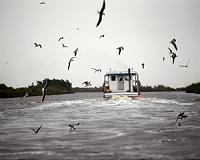 |
New Orleans, Louisiana (AFP) May 2, 2010 Louisiana's 2.4-billion-dollar a year commercial and recreational fishing industry was dealt its first major blow from the oil spill Sunday, as the US government banned activities for 10 days due to health concerns. "NOAA is restricting fishing for a minimum of ten days in federal waters most affected by the BP oil spill, largely between Louisiana state waters at the mouth of the Mississippi River to waters off Florida's Pensacola Bay. The closure is effective immediately," said the National Oceanic and Atmospheric Administration. Louisiana accounts for an estimated one-third of the country's total oyster output, and the Gulf of Mexico are prime spawning waters for fish, shrimp and crabs, as well as a major stop for migratory birds. "NOAA scientists are on the ground in the area of the oil spill taking water and seafood samples in an effort to ensure the safety of the seafood and fishing activities," said NOAA administrator, Doctor Jane Lubchenco, quoted in the statement. "I heard the concerns of the Plaquemines Parish fishermen as well other fishermen and state fishery managers about potential economic impacts of a closure," said Lubchenko, who met with more than 100 fishermen on Friday night. "Balancing economic and health concerns, this order closes just those areas that are affected by oil. There should be no health risk in seafood currently in the marketplace." Secretary of Commerce Gary Locke said in the statement: "We stand with America's fisherman, their families and businesses in impacted coastal communities during this very challenging time. "Fishing is vital to our economy and our quality of life and we will work tirelessly protect to it." According to NOAA, 3.2 million recreational fishermen in the Gulf of Mexico took 24 million fishing trips in 2008 and commercial fishermen there harvested more than one billion pounds of finfish and shellfish in 2008. "There are finfish, crabs, oysters and shrimp in the Gulf of Mexico near the area of the oil spill," said NOAA regional administrator Roy Crabtree. "The Gulf is such an important biologic and economic area in terms of seafood production and recreational fishing." Harlon Pearce, chairman of the Louisiana Seafood Promotion and Marketing Board, backed NOAA's measure, saying the move "is a necessary action to ensure the citizens of the United States and abroad that our seafood will maintain the highest level of quality. "We Support NOAA's precautionary closure of the affected area so that the American consumer has confidence that the seafood they eat is safe," he said. George Barasich, president of the United Commercial Fishermen's Association, meanwhile Sunday, filed an emergency request for a temporary restraining order against BP's contract for oil clean-up workers, which his lawyers said would allegedly preclude them from suing the oil giant. BP is hiring fishermen to help clean up from the spill and deploy boom in the Gulf of Mexico. The legal documents BP is asking the volunteers to sign would "seriously compromise" any spill-related legal claims against the oil giant, said Barasich's attorney Stuart Smith. "That BP would attempt to force this one-sided and egregious agreement on volunteers in the midst of this environmental disaster shocks the conscience," Smith said in a press release. NOAA said it was working with the state governors to evaluate the need to declare a fisheries disaster in order to unlock millions of dollars in federal aid to fishermen in these areas. Louisiana and Mississippi have already requested that NOAA declare a federal fisheries disaster. An estimated 210,000 gallons of crude a day has been streaming from the wellhead below the Deepwater Horizon rig that sank on April 22, two days after a massive explosion that killed 11 workers.
Share This Article With Planet Earth
Related Links Farming Today - Suppliers and Technology
 Louisiana 'way of life' at risk as oil spill threatens fishing grounds
Louisiana 'way of life' at risk as oil spill threatens fishing groundsVenice, Louisiana (AFP) May 2, 2010 As a sea of crude oil threatens to wash away her livelihood, Margaret Legnon stares at the boats sitting idle in the docks and wonders how long her coastal Louisiana fishing town can get by. Not to mention what all those shrimp and crab lovers in New York and Detroit and Los Angeles will do if one of the nation's largest sources of wild seafood is poisoned. "It's going to be ugly," Legno ... read more |
|
| The content herein, unless otherwise known to be public domain, are Copyright 1995-2010 - SpaceDaily. AFP and UPI Wire Stories are copyright Agence France-Presse and United Press International. ESA Portal Reports are copyright European Space Agency. All NASA sourced material is public domain. Additional copyrights may apply in whole or part to other bona fide parties. Advertising does not imply endorsement,agreement or approval of any opinions, statements or information provided by SpaceDaily on any Web page published or hosted by SpaceDaily. Privacy Statement |